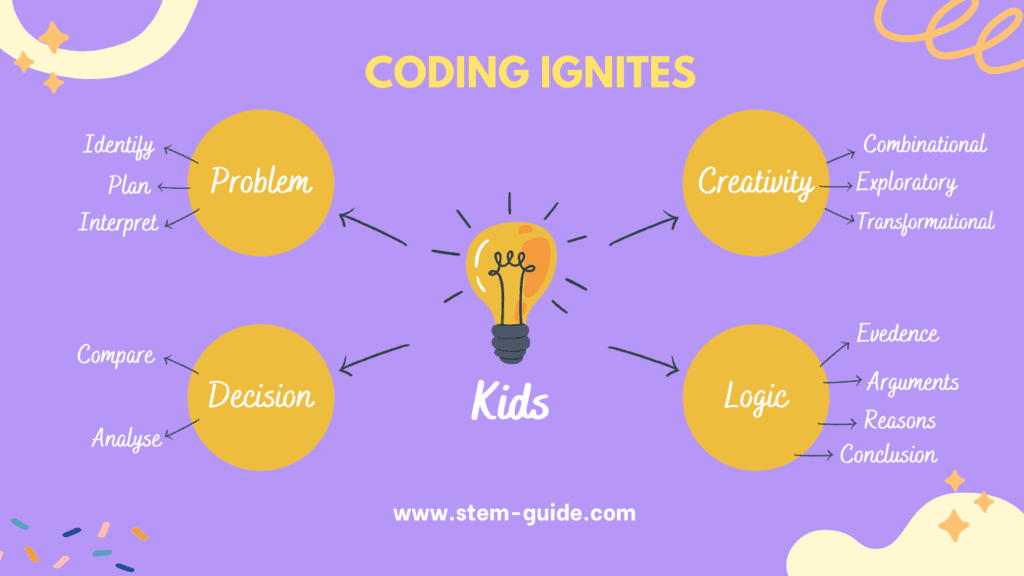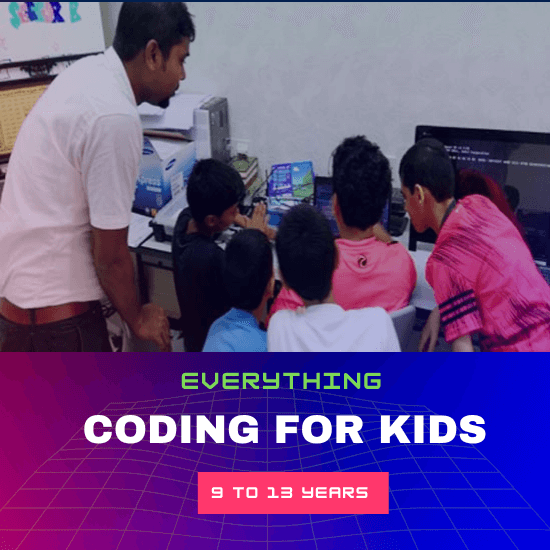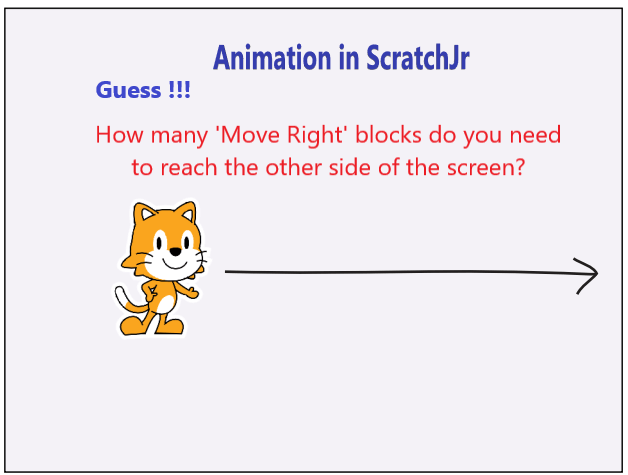Coding for kids is one of the most important skills that 9 to 14 years of children should learn to become experts. Today, kids are more fascinated to use smart devices and play video games and became the largest consumers of technology. Almost every parent complains about a lack of interest in studies among their children and excessive use of smartphones.
In such a case, engaging them in creative STEM activities, coding classes, IoT projects, aeromodelling, and robotics will increase interest in learning new skills and becoming experts in different domains. Coding skills make them creative and become problem-solver in the future.
What is coding for kids?
Coding for kids means teaching them how to write a set of instructions in computer language. This set of instructions creates communication with the computer which is also known as coding or programming. Through this coding only we can make the computer perform different tasks.
Today, children are more engaged in consuming digital media and technology. They play games and use different apps for entertainment that sometimes affect them badly. Coding knowledge can help them create their apps, video games, and own websites.
It is very similar to using different languages to communicate with each other – English, Spanish – Computers also have many languages they understand. For example, Python, C++, JavaScript, and many more. These are text-based coding languages where you need to write the syntax or script text manually.
Again, for kids who are new to coding, visual and block-based coding will be the best option for them to learn. They can simply drag and drop coding blocs and work on the properties to understand the fundamental concepts of coding.
In graphical programming like Scratch, ScratchJr., kids connect the coding block to make their program. This empowers them to understand the logic of coding, without thinking about syntax errors and typing mistakes.
What is coding used for?
Coding is used for making things work for you, making your jobs easier, and saving and improving your life. You can use coding to design apps and websites for business, education, and entertainment. For example, when you use a mobile phone to call your friend, you are using the app designed using computer codes.
Similarly, coding is used everywhere in your surroundings to make jobs easier for people from the kitchen to flying an airplane. If you look at your home, a few lines of code makes washing machine and microwaves work automatically. If you travel somewhere through metro rail you can see doors working automatically and consistently without human interventions. When you are at the airports, you see escalators and shoe polish machine starts automatically once you step on them.
In fact, coding has become an important part of human life. With the help of coding, you can control and monitor everything from home to your business and industries. Researchers developed artificial intelligence tools to predict future cancer and make new deserts.
Importantly, children who learn coding during their schooling day can choose many exciting careers connected with coding including entry-level careers in computer science as well as:
- Website developer
- Application developer
- Health care
- Aviation
- Computer system engineers etc.
Is coding good for kids’ brains?
Yes, coding is the process where you use computer codes to solve a real-life problem. The coding process needs you to think ten steps ahead which helps students to learn thinking. It also involves logical thinking and problem-solving skills that kids can easily inculcate through coding practice.
How is coding used for everyday life?
Coding is used in everyday life right from home application to industrial automation and observing patients in ventilation. With the help of coding, people are making drones to deliver medicines in emergencies and aerial traffic surveillance.
A few of my high school level students designed electronic gadgets to monitor terrace gardens and plant watering devices. They have used Arduino boards, simple electronics components, sensors, actuators, and a few lines of coding to make these devices
The students who find coding interesting take part in various science and engineering fairs and get rewarded.
Benefits of learning to code for students!
The students sitting in the classroom today are going to lead the nation tomorrow. If they are not equipped with the necessary skills then the overall growth of the nation is going to be affected.
Now, learning to code is considered as learning a second language for better communication. If you speak English well you can travel around the world easily as it is spoken everywhere.
Similarly, In today’s digital era, if you learn to code you will be able to explore the digital world smoothly.
There are a lot of benefits a student can get from coding starting from living a hassle-free life, running a business, and getting a wonderful job.

Here are some of the important benefits mentioned:
- Important skills for a job opportunity: Coding is recognized as one of the most important skills and there are jobs available in this field. In almost every sector whether in education or e-commerce, marketing or service, there are plenty of jobs related to coding.
- It teaches problem-solving skills: The concept of coding begins with the mission to solve a problem whether it is big or small. The first task that every student learns in the coding or programming class is to display the “Hello World” on the computer screen. And I remember how challenging was it for some of my classmates to print the “Hello World” message using the Turbo C++ compiler 20 years back.
- Enhance logical thinking: Coding and computer programming enhance logical thinking skills. As it involves you being analytical and breaking down a complex problem into smaller chunks and solving it. This skill is expected by the employer in every industry.
- Learning to code helps the student become creative: When you are coding, you are ultimately creating something new. So coding makes students very creative and they create Apps, video games, and projects they love to do. By learning how to code, students are maximizing their creativity to think out of the box and find solutions.
Will coding make you smarter?
As a mentor, I have observed how students behave before and after joining coding classes. Here is a small instance where a student of class VII did not perform well in the examination and wanted to join the coding club. The principal was not allowing him to join my coding class as his academic performance was not good. But I managed everything by looking at his interests and he joined the class.
I realized that learning to code can help a student do better in other subjects he is learning or studying. Over the next three months, he improved a lot in his studies and recognized himself as one of the best performers not only among his batchmates but also in the school itself.
Learning to code helps you know how to break down a problem into small steps and find solutions. It also develops a mindset of taking a challenge and breaking it into smaller chunks which is the best way to become smarter.
Why coding should be taught in school?
The world is changing very fast and the demand for this changing economy is also moving faster. The service industries are facing a lot of challenges and those who can innovate will survive in this ever-changing economy. Now, the manufacturing and service sector companies are creating high-paying job positions that did not even exist five years back. And you can’t imagine the kind of challenging jobs that will be available in the next ten years.
Who will be a suitable candidate for these challenging positions?
Those candidates who are ready to take on the challenges, extremely analytical, and who can think and decide to solve problems can be considered suitable.
How do prepare school children for future jobs?
The only answer is coding; which can help our children to acquire and improve the highly expected skills required for those positions. Where the traditional educational systems grappled with a lack of innovation, infrastructure, and an old-fashioned curriculum.
Now, coding is the best and most well-structured option to introduce and make students realize the need for logical thinking and problem-solving skills. Coding concepts help students to develop an analytical mindset as every step in coding requires some sort of thinking, and analyzing data to solve problems. Sometimes, the coder needs user input or data from sensors and analyzes them to make informed decisions.
Generally, school-level students are more enthusiastic and can work on creative projects interestingly. Introducing coding classes to them will create an opportunity to enhance skills and capability in the early stages. Once they learn to code, they can use it to design Apps or programs to solve different problems related to the fields they pursue higher education.
What skills do you learn from coding?
You may think that coding is just a technical skill that is limited to getting a job in the IT sector. But students who learn to code also develop some essential skills that help them not only to get a job but also live a planned and happy life.
- Communication: while learning coding students get to develop soft skills and how to communicate with their team members, colleagues, and clients. They also learn to fulfill expectations, understand and interpret requirements, and effectively convey what is given in a brief.
- Creativity: students become creative in the process of learning to code and they become creators and express their ideas in different ways. When they create a recipe app or a self-driven toy car or website for a client, they are converting other people’s needs into thoughtful creative projects.
- Logic: This is a skill that students can practice through coding. They become increasingly analytical by anatomizing the existing projects to understand the process and find solutions. Be it a fresh coding project or debugging project, coders always need to exercise logical thinking regularly.
- Problem-solving: As a coder, the first important attribute is to decompose a problem into smaller chunks and solve it. This skill is equally important and can be applied irrespective of fields and domains beyond coding.


